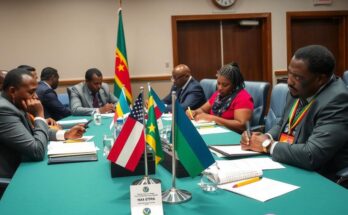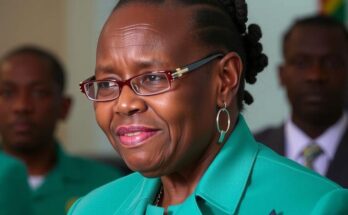As Ghana approaches its presidential elections, illegal mining, known as ‘galamsey,’ poses a significant challenge. Miners labor under harsh conditions while contributing to severe environmental degradation. With the elections between Vice President Mahamudu Bawumia and former President John Mahama, there are pressing calls for a cohesive strategy to address this issue. The outcome could shape the future of sustainability and job creation in the country.
In Ghana, illegal mining, popularly known as “galamsey,” has emerged as a significant issue as the country approaches presidential elections. Miners, such as Frank, described working under harsh conditions near Accra, where they are driven by unemployment and poverty. They face an income that barely meets their needs while contributing to extensive environmental degradation, including polluted rivers and deforested lands. With Vice President Mahamudu Bawumia contesting against former President John Mahama, the elections could manifest how the government intends to address this pressing issue. Despite promises to eliminate illegal mining, the practice has flourished, fueled by economic pressures and inadequate job opportunities. Protesters and advocates call for a cohesive and enforceable strategy to address the environmental devastation caused by illegal mining, emphasizing the need for engagement with all stakeholders. Efforts to curb galamsey have been criticized for being inconsistent, leading to continued devastation of Ghana’s agricultural and water resources. For many, including the youth, the upcoming elections symbolize a moment where their voices regarding environmental sustainability and job creation could resonate with the political elite.
Ghana is the world’s sixth-largest gold exporter and the second-largest producer of cocoa. The illegal mining sector plays a significant role in Ghana’s economy, providing employment for over one million individuals, many of whom are youth. However, this growth has come at a considerable cost to the environment, leading to severe ecological repercussions and community protests. Concerns have been raised about the impacts of illegal mining on agriculture, particularly cocoa production, which is a crucial source of national income.
The ongoing issue of illegal mining in Ghana highlights a critical intersection between economic survival and environmental conservation. As the nation prepares for elections, the sentiments and struggles of miners like Frank underscore a demand for governmental accountability and a comprehensive approach to the mining crisis. The political landscape is pivotal for shaping sustainable policies that support job creation while mitigating the harmful effects of galamsey.
Original Source: www.barrons.com




